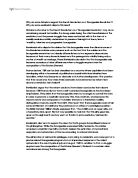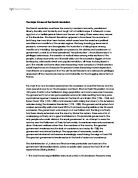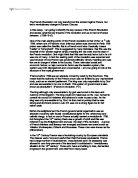France before 1789 can be best described as a country where capitalism had been developing within a framework of political and social institutions inherited from feudalism, which had become an obstacle to its further development. The question that then arose was: how were these obstacles to be removed: by reform from above or revolution from below?
Revisionists argue that the reform could not have been conducted from above because 1789 France did not have a self-conscious bourgeoisie as has had been emphasized. They claim that the bourgeoisie were not so eager to control the state in order to promote a capitalist economy. This, they maintain, was because the second estate was composed of ‘notables’ instead of a hereditary nobility, distinguished more by wealth than birth. This meant that the bourgeoisie could attain some entitlement of nobility by the purchase of an office at a prestigious position; the British historian William Doyle expressed that, “the nobility was an open elite, not a hereditary class apart. Not is it now possible to maintain that this elite grew less open as the eighteenth century went on thanks to some exclusive ‘aristocratic reaction’
Revisionists also tend to support the view that both groups shared liberal values of the philosophes. While the bourgeoisie were essentially moderate, the nobles acquired a capitalist mentality and both desired the extinction of monarchical despotism and reformation of France according to rational standards.
The elimination of aristocratic privileges, according to revisionists, was never part of a preconceived bourgeoisie program, but an improvised response to the violent upheavals in the country side in july and august 1789. In addition to that, a struggle erupted over the composition of the Estates General, this lead to a sudden class consciousness among the bourgeoisie.
Albert Soboul being one of the historians that support the ‘Bourgeoisie Revolution’ states, “the essential cause of the Revolution was the power of a Bourgeoisie arrived at its maturity and confronted by a decadent aristocracy holding tenaciously to it’s privileges.”
The bourgeoisie are perceived as the beneficiaries as well as the benefactors of the Revolution by some historians, on account of their determination to break the barriers placed upon them by the Nobility, as such historians will claim to achieve their much deserved upward social mobility.
Historians view them as equipped with their merit and imbued by the rational ideas of the enlightenment and the live examples of the American Revolution.
These historians imply that not only did the bourgeoisie put into motion this reform but also ended the class divisions successfully.
This influence of the bourgeoisie can be seen in many areas. As they were the educated of the Third Estate, they did indeed set things in motion. For instance, they demanded a constitution representing the whole “nation”. This aim was openly expressed in an immensely influential pamphlet that appeared in 1789 called ‘What is the Third Estate?’ written by Abbe Sieyes. The pamphlet answered the question arguing that the Third Estate alone constituted the nation, the nobility being nothing but privileged parasites: “The nobility...is truly a nation apart, but a bogus one which, lacking organs to keep it alive, clings to a real nation like those vegetable parasites which can live only on the sap of the plants that they impoverish and blight.” This also further reflects the great class differences and the resentment and rage.
The constitution also incorporated the Declaration of the Rights of Man and the Citizen that had been adopted by the National Assembly in August 1789. This was drawn up by and therefore favouring the bourgeoisie as they were the ones overlooking it.








